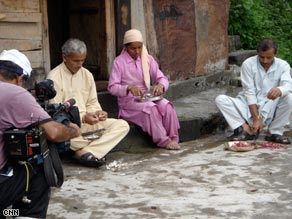Ab-Titchaz
JF-Expert Member
- Jan 30, 2008
- 14,631
- 4,225
Brothers share wife to secure family land

Kundar Singh Pundir, left, and his brother Amar, right, share Indira Devi, centre, as their wife.
HIMACHAL PRADESH, India (CNN) -- Amar and Kundan Singh Pundir are brothers. Younger brother Amar breaks rocks in a mine for a living. Kundan farms their small piece of inherited land. They live in a beautiful but remote hillside village in the clouds of Himachal Pradesh, India.
Both aged in their forties, the two brothers have lived together nearly their whole lives. They are poor and share just about everything: Their home, their work and a wife.
"See we have a tradition from the beginning to have a family of five to 10 people. Two brothers and one wife." Kundan says.
They practice what is known as fraternal polyandry -- where the brothers of one family marry the same woman. Why? Tradition and economics.
Life is hard here. The village is precariously perched on the side of a very steep hill about 6,000ft up. Most of the villagers survive off tiny plots of cropland.
In this difficult terrain there isn't enough land to go around. So, instead of finding separate wives and splitting up their inherited property, the brothers marry the same woman and keep their land together.
Wife Indira Devi says life with two husbands isn't easy.
"We fight a lot."
But like any married couple they fight mostly over mundane stuff, except there are three spouses instead of two.
"Usually it's about chores, why didn't you do this? Why didn't you do that?" she says.
One thing they agreed on was the need to have children; They have three. So how does a married trio deal with sex?
"We make shifts, change shifts and sleep on alternate days. We have to make shifts otherwise it won't work," Kundan says.
"To run our families we have to do this, overcome the hurdles as well and then we have to control our hearts from feeling too much," Amar adds.
To outsiders their arrangement may seem odd, but in the village of about 200 it is the norm.
Typically the marriages are arranged and women have two husbands. But some wives have three or four depending on how many brothers there are in a family.
Polyandry is illegal in India but socially acceptable here. No one from the government seems to bother the villagers about the law.
"It's been going on for ages. My sister in law has two husbands, my mother in law also has two husbands," Indira says.
And as to the question of which husband is the biological father of the children -- the Pundir's don't know and don't care.
"For me everyone is the same, my mother and my fathers are the same. My mother and my fathers are like God to me," 17-year old daughter Sunita Singh Pundir says.
Even as modern society arrives in this ancient village through satellite dishes and mobile phones, the Pundirs say they want their age-old tradition to continue with their children.
"Absolutely," eldest son Sohna says.
He and his younger brother have already discussed it and will marry the same woman.
Daughter Sunita isn't so sure.
"I would like one husband," she says.
But when asked if she will marry for love or tradition, Sunita's answer makes it clear the tradition of marrying more than one man will continue with the next generation.
"I will never leave our tradition even if I have to forgo love. I will never spoil my parents' reputation and my brothers.
Brothers share wife to secure family land - CNN.com